Jewish Folktales and Talmudic Stories (Page 4) |
If you wish to purchase any of these books, click on either the title or the book cover to be directed to Amazon.com. As a warning, I have put up pictures of the book covers to give you somewhat an idea of the style of each book (I know, I know. "Don't judge a book by its cover") so the pages may load slowly, depending on the speed of your internet connection.
If this page came up without frames, Click here to see the complete website
Other Pages of Interest:
Jewish Folktales and Talmudic Stories for Children
(Page 1)
(Page 2)
(Page 3)
(Page 4)
(Page 5)
(Page 6)
(Page 7)
Easy Reader and Picture Books:
Jewish Children's Books (General) |
Jewish Board Books |
Biblical Stories for Children |
Jewish Holiday Books |
Jewish Family Cookbooks |
Jewish Folktales and Talmudic Stories for Children
(Page 1)
(Page 2)
(Page 3)
(Page 4)
(Page 5)
(Page 6)
(Page 7)
|
Jewish Life Books (Mitzvot, Keeping Kosher, etc.) |
Jewish Life Cycle Books |
Family Haggadahs |
Children's Prayerbooks |
Introductory Hebrew Books |
Jewish History and Historical Fiction Picture Books |
Israel Books
Middle School and YA Books:
Bar Mitzvah Books |
Jewish Fiction |
Historical Fiction |
Torah Study |
Prayer and Jewish Life Books |
Jewish Holidays |
Jewish Biographies |
Jewish History Books |
Holocaust Books for Teens |
Israel Books
Jewish Books for Children |
Bar Mitzvah Books |
Jewish Parenting Books |
Jewish Music for Children |
Jewish Videos |
Jewish Toys and Gifts |
Jewish Gift Baskets and Gourmet Food |
Jewish Jewelry |
Amazon.com Coupons, Promotions, and Sales
If this page came up without frames, Click here to see the complete website
Other Pages of Interest:
Jewish Folktales and Talmudic Stories for Children
(Page 1)
(Page 2)
(Page 3)
(Page 4)
(Page 5)
(Page 6)
(Page 7)
Easy Reader and Picture Books:
Jewish Children's Books (General) |
Jewish Board Books |
Biblical Stories for Children |
Jewish Holiday Books |
Jewish Family Cookbooks |
Jewish Folktales and Talmudic Stories for Children
(Page 1)
(Page 2)
(Page 3)
(Page 4)
(Page 5)
(Page 6)
(Page 7)
|
Jewish Life Books (Mitzvot, Keeping Kosher, etc.) |
Jewish Life Cycle Books |
Family Haggadahs |
Children's Prayerbooks |
Introductory Hebrew Books |
Jewish History and Historical Fiction Picture Books |
Israel Books
Middle School and YA Books:
Bar Mitzvah Books |
Jewish Fiction |
Historical Fiction |
Torah Study |
Prayer and Jewish Life Books |
Jewish Holidays |
Jewish Biographies |
Jewish History Books |
Holocaust Books for Teens |
Israel Books
Jewish Books for Children |
Bar Mitzvah Books |
Jewish Parenting Books |
Jewish Music for Children |
Jewish Videos |
Jewish Toys and Gifts |
Jewish Gift Baskets and Gourmet Food |
Jewish Jewelry |
Amazon.com Coupons, Promotions, and Sales
Other Pages of Interest:
Jewish Folktales and Talmudic Stories for Children
(Page 1)
(Page 2)
(Page 3)
(Page 4)
(Page 5)
(Page 6)
(Page 7)
Easy Reader and Picture Books:
Jewish Children's Books (General) |
Jewish Board Books |
Biblical Stories for Children |
Jewish Holiday Books |
Jewish Family Cookbooks |
Jewish Folktales and Talmudic Stories for Children
(Page 1)
(Page 2)
(Page 3)
(Page 4)
(Page 5)
(Page 6)
(Page 7)
|
Jewish Life Books (Mitzvot, Keeping Kosher, etc.) |
Jewish Life Cycle Books |
Family Haggadahs |
Children's Prayerbooks |
Introductory Hebrew Books |
Jewish History and Historical Fiction Picture Books |
Israel Books
Middle School and YA Books:
Bar Mitzvah Books |
Jewish Fiction |
Historical Fiction |
Torah Study |
Prayer and Jewish Life Books |
Jewish Holidays |
Jewish Biographies |
Jewish History Books |
Holocaust Books for Teens |
Israel Books
Jewish Books for Children |
Bar Mitzvah Books |
Jewish Parenting Books |
Jewish Music for Children |
Jewish Videos |
Jewish Toys and Gifts |
Jewish Gift Baskets and Gourmet Food |
Jewish Jewelry |
Amazon.com Coupons, Promotions, and Sales
Easy Reader and Picture Books:
Jewish Children's Books (General) | Jewish Board Books | Biblical Stories for Children | Jewish Holiday Books | Jewish Family Cookbooks | Jewish Folktales and Talmudic Stories for Children (Page 1) (Page 2) (Page 3) (Page 4) (Page 5) (Page 6) (Page 7) | Jewish Life Books (Mitzvot, Keeping Kosher, etc.) | Jewish Life Cycle Books | Family Haggadahs | Children's Prayerbooks | Introductory Hebrew Books | Jewish History and Historical Fiction Picture Books | Israel Books
Middle School and YA Books:
Bar Mitzvah Books | Jewish Fiction | Historical Fiction | Torah Study | Prayer and Jewish Life Books | Jewish Holidays | Jewish Biographies | Jewish History Books | Holocaust Books for Teens | Israel Books
Jewish Books for Children | Bar Mitzvah Books | Jewish Parenting Books | Jewish Music for Children | Jewish Videos | Jewish Toys and Gifts | Jewish Gift Baskets and Gourmet Food | Jewish Jewelry | Amazon.com Coupons, Promotions, and Sales
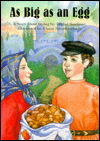 As Big As an Egg : A Story About Giving By Rochel Sandman |
God's messengers take mysterious forms. The story takes place in
Russia during World War II when food was scarce. After standing
on a long line following a hard day of work to obtain his ration of
bread, Chaim is stopped by Bubbe Hinda who is collecting
donations of bits of bread for poor people. Chaim breaks off a
piece of bread as big as an egg and drops it into the sack. Unwilling
to contribute again, he avoids Bubbe Hinda and keeps the whole
loaf of bread, securing it after dinner and covering all the mouse
holds to protect it from mice. But for three mornings he finds a
piece missing as big as an egg and spies a mouse's tail disappearing.
Finally, he understands and donates thereafter, as big as two eggs,
after which the mouse runs out of the house and his bread is no
longer robbed. This is an appealing well-told story that reads like
a folk tale although it is based on a true story. It has two child-pleasing
repetitive refrains: a Yiddish blessing and the as big as an egg,
and well composed, drawn and painted evocative illustrations.
|
 The Story Tree: Tales to Read Aloud By Hugh Lupton |
This delightful collection of tales from around the world includes favorites like "The Three Billy Goats Gruff" (Norwegian) as well as less familiar stories such as "The Blue Coat" (Jewish) and "The Sweetest Song" (African-American). Hugh Lupton's engaging narrative quickly draws young readers into each story, while Sophie Fatus's quirky illustrations will have children laughing in their seats, ensuring hours of entertainment.
This collection of stories from around the world includes English, African-American, Indian, Russian, German, and Norweigan tales. The Jewish narrative, "The Blue Coat" is based on the Yiddish story Joseph Had a Little Overcoat. In this story, a little boy needs a coat, so his mother buys some blue fabric and makes it for him. After a while, the coat becomes worn, so his mother reworks the coat into a waistcoatt. This happens over and over, until eventually, she reworks it into a button. The theme of resourcefulness is clearly illustrated throughout the story. The book's whimsical illustrations and creative layout enhance all the stories. I was a bit confused when the first line of each story is repeated twice (Was it a typographical error or done intentionally). The protagonist of the Jewish story is named "Tom", which took away from some of its authenticity. All in all, however, this is a good collection to show different tales throughout the world. |
 Why the Moon Only Glows By Dina Rosenfeld |
This Midrash, retold for very young children, features two small
children, Leah and Dov. The children ask their abba (father) to
retell the story why the sun shines so brightly and the moon can
only glow. The retold Midrash is rhymed which makes it more
attractive to children and the illustrations add immeasurably to
the story line. As the author suggests, a lesson can also be
taught from the story, namely, that one should be satisfied
with whatever he gets and not begrudge the good fortune of
others. The book is charming and delightful and can be enjoyed
by youngsters from preschool age up.
|
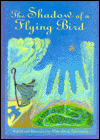 The Shadow of a Flying Bird : A Legend from the Kurdistani Jews By Mordicai Gerstein |
A moving fable that incorporates the Jewish concept of struggling with God.
Moses has lived his allotted time, but he is not yet ready to die, despite God's call. Although he eloquently pleads for more time--"Turn me into a tiny butterfly, only let me live". God refuses to extend his life, sending the archangels to fetch Moses' soul, but they are too sorrowful to perform the task; only the angel of death takes on the assignment with relish, but Moses smites him. So the Lord Himself descends to Earth to take Moses' soul with a kiss; yet afterward, He experiences almost unbearable sadness. He has lived up to His own rules, but He has lost the human closest to Him. The Chagall-like paintings, featuring cabalistic symbolism and heavenly colors, are full of magic. Younger children probably will not understand either the story or the art in a conventional manner, but they will intuit the themes of love, loss, and humanity's mysterious relationship with God. The best audience for this, however, may be older children who will be able to talk about many of the poignant issues the story raises. |
 Mendel Rosenbusch: Tales for Jewish Children By Ilse Weber |
These Czech folktales are the work of a gifted writer who perished at Auschwitz. The
title character, a good and wise man, is granted the power by the Almighty to become
invisible at will. He uses his talent to help neighbors who are faced with crises and
problems. Mendel is especially interested in the poor and children.
Despite the supernatural element, Weber's tales paint a knowing portrait of small-town pre-Holocaust Jewish life in Central Europe. Her characters are multidimensional, interesting, and unpredictable. Their strengths and weaknesses mirror human nature. Her plots are original and filled with humor. The collection is imbued with the traditional Jewish beliefs that people can change for the better, and that doing the right thing for the wrong reason can lead to a more positive motivation. Moral lessons are subtle. An afterword by translator Hans Fisher describes how these tales were rediscovered and made available to English-speaking children. The author's fate and the fate of the communities about which she wrote lend poignancy to this excellent collection. The cover illustration of an old-fashioned-looking Mendel could deter readers. |

The Magic Apple By Corinne Demas |
In this Road to Reading entry, Demas offers a clever version of a mitzvah story from the Jewish tradition. Three sisters, Ella, Bella, and Stella, return from their travels with, respectively, a magic spyglass, a magic horse, and a magic apple. The spyglass and horse bring the three to a dying prince's bedside; then slices of the apple revive him, earning his hand and half the kingdom for one sister--but which? Natchev garbs his figures in colorful eighteenth-century dress and follows Demas' lead in keeping the sisters friends rather than competitors; when the prince makes his choice, the other two happily accede, and the stage is set for an apple-pie wedding feast. The text runs to seven or fewer words per line, with an only slightly denser note on the tale's type and source appended. A natural next step for young fans of Alvin Schwartz's easy-reader collections.
|
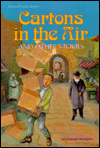 Cartons in the Air and Other Stories By Shaindel Weinbach |
Delightful true tales from around the globe and through the centuries retold
by Shaindel Weinbach, beautifully illustrated by Yosef Dershowitz.
|

The Merchant of Groski: And Other Tales My Great-Great- Grandfather Might Tell About Life in a Ghetto of Russia in the Time of the Czars By Herman I. Kantor |
27 short stories are presented as the fictionalized experiences of Kantor's actual
great-great grandfather Shmul, a resident of the small shtetl of Orsha in central Russia,
first as a young newspaper "gopher," then as the rabbi of his ghetto. The tales are
narrated by Shmul and include tales of colorful Russian characters he meets on a
train, such as a snake-oil peddler, a nursing mother who abandoned her baby on
the train, and a lady of the night who became a prima ballerina. The rabbi stories
include tales of a musician who played at his own funeral, and a children's game
that became a national pastime
Kantor prefaces his first attempt at fiction like this: "I never knew my great-great-grandfather Shmul. . . . But if he were to discuss his experiences as a youth and after he was ordained as a rabbi, I imagine these are the stories he might tell. . . .'' This timid introduction contrasts markedly with his amusing and uplifting group of tales, spun by the cocky ghetto youth Shmul, who works for the shtetl newspaper of Orsha to earn funds for rabbinical studies. He meets many entertaining characters while commuting by train between Orsha and the city of Smolensk (where Shmul picks up a packet of international news stories from a larger-circulation newspaper), including a "lady of the night'' who becomes a star ballerina; a wolfhound breeder who presents Shmul with a dog in defiance of a rule forbidding Jews to keep pets; and a hustling "snake medicine'' man. After Shmul becomes a rabbi he conveys enlightening yarns about his ghetto community, including a satisfying one of political revenge by a young man for the brutal murder of his parents by Cossacks. And wise morals abound, such as "When you meet a bird that is different from all the others, don't hang onto it. . . . Get rid of it as fast as possible!'' |
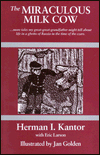
The Miraculous Milk Cow: More Tales My Great-Great-Grandfather Might Tell About Life in the Ghetto of Russia in the Time of the Czars By Herman I. Kantor |
Aided by a fertile imagination and a sure feeling for 19th-century
Eastern European culture, Kantor has woven a rich tapestry of
folklore depicting Jewish life in the village of Orsha, the actual
home of a rabbi ancestor. Sixteen engaging stories mirror the
people's daily struggle to maintain a religious/cultural identity in
oppressive, anti-Semitic, czarist Russia. Some episodes deal with
light themes, e.g., two bickering neighbors in conflict over a constantly
escaping rooster need the rabbi to suggest a higher fence. In another
vividly told tale, a spontaneous gypsy wedding leads to greater
understanding between vastly different people. Other less-humorous
accounts confront the misery often caused by customs such as arranged
marriages. One misguided union results in an unpunished murder.
Invented Yiddish and Russian names lend an authentic tone (and help to
mitigate the occasional anchronism or lapse into colloquial English);
primitive black-and-white illustrations enhance the text.
Understanding a few of the plots requires a level of sophistication.
Succeeding in its attempt to preserve the cultural legacy of a rich tradition,
however, The Miraculous Milk Cow is a good choice for both school and public libraries
|

The Matzo Mitzvah : Even More Tales My Great-Great-Grandfather Might Tell About Life in a Ghetto of Russia in the Time of the Czars By Herman I. Kantor |
Stories include:
|
 Call of the Shofar and other stories By Chana Zuber-Sharfstein and Nissan Mindel, |
Favorite short stories for young children, these tales of shtetl life are
rich with moral content. Contains four stories, including "The Mirror,"
"The Bride," "The Little Tyrant," and the title story.
|
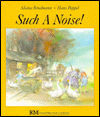 Such a Noise! A Jewish Folktale By Aliana Brodmann-Menkes |
In this humorous retelling of a Jewish folk tale, the farmer complains to the rabbi
about the noise and confusion in his house. Following the rabbi's advice, he brings
in his whole barnyard of animals and then is greatly relieved when he finally removes them.
The book suffers in comparison to Margot Zemach's matchless picture
book It
Could Always Be Worse
|
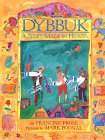 Dybbuk : A Story Made in Heaven By Francine Prose |
In her first children's book, Prose weaves two old Jewish legends into a warm,
funny story of love and trickery. Podwal's gouache and watercolor illustrations
express the gentle magical realism of this shtetl tale; there's even a brightly
colored picture of fiddlers on the roof. Before Leah and Chonon are born, the
angels in heaven get together and decide that these two humans will marry. Leah
grows up smart and pretty, and she does fall in love with Chonon, a brilliant
student with the kindest heart and the loudest sneeze--Achoo! But her parents
want her to marry Mean Old Benya, the most powerful man in Chopski. At the
wedding, Leah talks in a deep, growling voice and sneezes loud--Achoo! over
everything. The rabbi says it's because Leah is possessed by a dybbuk, and
nothing can drive out the spirit until Leah is allowed to marry the man the
angels chose. Adults who know the wild dybbuk stories may find this version too
sweet, but the telling is wonderfully theatrical; there's no way to read this
without acting the parts and laughing out loud.
|